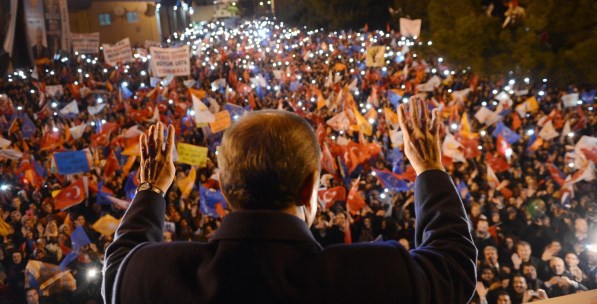Since the 2010 referendum symbolizing the collapse of the tutelage, the tug of war between the governing Justice and Development Party (AK Party), as the strongest actor of building the New Turkey, and the camp that opposes the building of the New Turkey by the AK Party has gained momentum. This broil turns more heated on the eve of 2014 and as 2015 approaches; the years that the construction of the New Turkey will take a start in real terms. In this manner, the dispute has hardened in 2013 as the criticisms targeting the AK Party have transformed into an operation against the legitimacy codes of the AK Party. In this period, three messages have been given about the AK Party by a perception engineering operation: It is turning into an Islamist party; it is a transition-period-hybrid regime party; and it is guided by an irrational, authoritarian and radical leader. Through these elements the legitimacy codes of the AK Party have been questioned and it has been emphasized that the ruling party lacks the potential to be the actor of the New Turkey’s building process. At the beginning, this strategy has been progressed through perception engineering by an intellectual effort, but then evolved into an operational engineering by the Gezi Park protests. The December 17, 2013 operation process is the latest example of this. Launched by the Gulen Movement and having reached its peak with the December 17, 2013 process, the last operation is different from the previous attempts of perception engineering in character and the methods used.
PERCEPTION ENGINEERING
First of all, by attributing a pejorative meaning to the AK Party during the quarrels ushered in 2013, the thesis of the AK Party’s being a conservative-Islamist party has been inculcated often. As far as the national politics is concerned, the discourses, such as the new alcoholic beverage regulation, the debate over co-ed living in the same dormitories, the phrases of “religious generation” and “having three children” have been presented as a solid proof that the AK Party’s Islamism is becoming active again. The themes have been built and emphasized frequently that, as an extension of the Islamic politics inside, the AK Party has gotten involved abroad with Islamist groups in the Middle East. In terms of the Egyptian and Syrian issues, a relapse of “allergy to Islamism” in the international arena has been itched for and the foundations of AK Party’s legitimacy have been tried to be interrogated. In doing so, the AK Party has been put on the same scale with the Islamic groups who target radical theocratic states with a problematic understanding of democracy. With these criticisms, the message was that the AK Party has turned into a structure incapable of carrying the candidacy to the European Union, and the membership in NATO and the pro-Western alliance.
Secondly, there is the criticism of the AK Party’s being a transition-period and a hybrid-regime party for its understanding of “majoritarian” democracy. In a transition period, where the military-bureaucratic tutelage ruled the country, the will of nation was ignored, and the appointed were prioritized over the elected, and in this cohabitational transition-period-hybrid regime, the AK Party’s understanding of “majoritarian” democracy was tolerated and not criticized. Even more so, in order to make the national will dominant, the theme of “People’s Power,” which had been stressed by the AK Party very often at the time, was supported. As soon as the tutelary regime regressed, this transition period came to an end, and the AK Party’s understanding of majoritarian democracy was regarded archaic. The thesis inculcated that the AK Party served out its period as a transition period party, assuming the party had already exhausted its reformist energy; therefore, the thesis claimed that the AK Party increased the cost of democracy in Turkey, because it no longer can meet the demands for









